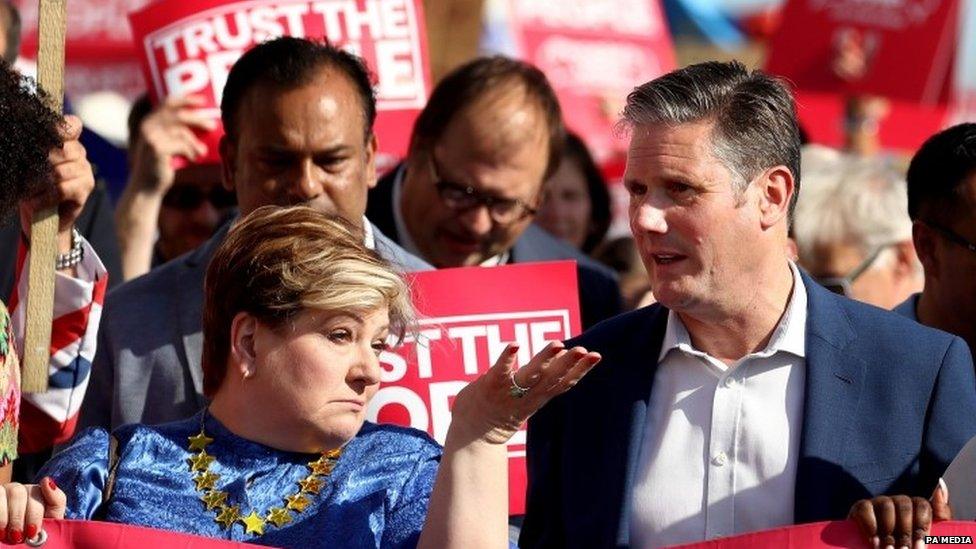Jeremy Corbyn faces calls to resolve Labour Brexit divisions
- Published

Jeremy Corbyn is coming under pressure amid divisions over Labour's Brexit strategy as leading figures call for the party to back staying in the EU.
Shadow foreign secretary Emily Thornberry said Labour must "say no" to leaving the EU at its party conference.
And deputy leader Tom Watson said it must settle its position as "a Remain party" once and for all this week.
But Unite leader Len McCluskey said anyone who could not support Jeremy Corbyn's position should stand aside.
He said talk of divisions were "fake news" given that Labour had a policy of giving the public the final say in another referendum which the shadow cabinet could unite around.
The party's NEC, or governing body, has agreed a motion which calls for the party to renegotiate the current terms of exit and then give voters the choice to back the new Brexit deal or to remain in the EU.
Mr Corbyn has persistently refused to be drawn on which way he would campaign in another vote, saying it would depend on the kind of agreement he struck.
Labour will also decide the terms of further motions on Brexit, which could call for the party to endorse a remain stance outright.
The exact wording of the motion to be debated will be decided later on Sunday and voted on Monday.
'Simple truth'
Mr Corbyn is under growing pressure to declare his hand from pro-EU figures in the party.
Addressing a rally organised by the Progress group in Brighton, Mr Watson - who saw off an attempt to oust him on Saturday - said the "simple truth is whatever anyone says - Labour is a remain party".
Calling on the leadership to "to settle once and for all our position", he said by backing remain "I'm sure we can deliver a Labour government".
And Ms Thornberry questioned "why on earth" Labour would be complicit in allowing the UK to leave the EU.
Labour "will have a special conference" to decide its stance on Brexit, Jeremy Corbyn says.
"Are we going to celebrate a Labour version of Brexit? No. We must have the Labour Party this week saying no to Brexit and we must lead the campaign to remain."


You might think policy is made on the conference floor but what goes behind closed doors - in smoke free rooms these days - is often more important.
Representatives from constituencies and from trade unions try to distil disparate motions on the same topic down in to just one, on which they can all agree - and this is then put to the conference for approval the following day in the full knowledge that it will pass.
But on Brexit, this usual template isn't working.
The gap between the leadership and many in the grassroots has proved difficult to bridge.
Labour's ruling national executive - which includes representatives of the big unions - has agreed a statement which would not commit the party to backing leave or remain until after any snap election.
On Sunday night, though, grassroots delegates are expected to agree a motion, which would commit the party to campaigning to remain in the EU during the election.
The pro-remain Mayor of London Sadiq Khan told me he would be urging delegates to stand firm on this and not to accept a fudge.
And I understand it, the call from Len McCluskey of Unite - for remainers to back down in the interests of party unity - is likely to go unheeded.
So as things stand, the differences between the leadership and much of the rank and file will be displayed in the full glare of publicity.
However, the unions account for 50% of the votes at Labour conference - and if they continue to stand firmly behind Jeremy Corbyn then the overtly pro-remain position will be defeated.
The political price could be high, though, and there will undoubtedly be further appeals for the remain motion to be withdrawn.

Speaking on the BBC's Andrew Marr show, Mr Corbyn acknowledged that most Labour supporters backed staying in the EU.
But he said the party needed to show more understanding of why the country voted leave and even if the UK were to remain in the EU, there needed to be serious reform.
Mr McCluskey, a key ally of Mr Corbyn, appealed for loyalty on the issue, saying the party must go into the looming general election "united".
"When we have a policy on Brexit and Jeremy Corbyn makes it clear that that is the policy, then that's what leading members of the shadow cabinet should argue for," he told Sky News.
"If they find they can't argue for it because they feel strongly, well, of course they have that right but they should step aside from the shadow cabinet…and they can argue whatever they want."